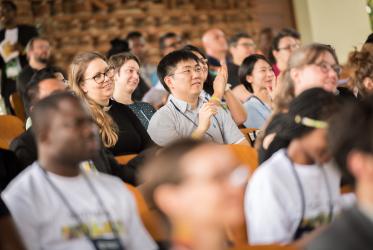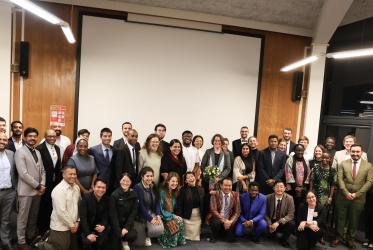Rev. Dr Ofelia Ortega Suárez may be 82 years old, but after the students at the Ecumenical Institute in Bossey heard her speak about the World Council of Churches (WCC) at 70: Achievements and Hopes, they said she has the lively spirit and enthusiasm of a 20-year-old.
“If you think that if you are going to be a pastor or a priest you are going to be in the pulpit, you’re wrong,” she said striding across the hall floor to listen to students’ questions, in a very personal way urging them, like her, to “dream of a better world”.
Ortega said that the commitment of the WCC to defending life has been permanent in its theological “alignment with the poor of the world through programmes of associated churches in favour of health, education work, cooperation and the unity of humanity”.
One student told her she is proof that age is just a number as she described 23 August 1948 as “the miracle that would be the foundation of what is happening at the WCC today was realized”.
Ortega knows the institute well, having graduated from the 1967-1968 class at Bossey and she was the keynote speaker at the 12 November “Dies academicus” a special academic gathering at the institute.
The day involved all Bossey’s students coming from nations including Canada, China, Egypt, Indonesia, Mexico, Myanmar, Nigeria, South Korea, Thailand, Ukraine, Zambia and others who showed their work in presentations and shared experiences.
Ortega’s ‘many firsts’
In the words of the WCC deputy general secretary and the director of the Ecumenical Institute, Fr Prof. Dr loan Sauca, she has many firsts including being the first Presbyterian woman to be ordained in Cuba, being the first Cuban at Bossey, and facilitating an early meeting of the WCC at the Vatican.
“The WCC is an organization with no equivalent in the history of Christianity,” said Ortega, who served as its regional president from the Caribbean/Latin America from 2006 serving until the WCC Assembly in Busan in 2013.
“It must be affirmed that the WCC constitutes the most important, best organized and most representative realization of the decided will of Christianity to visibly express the unity that Christ wished for his church,” she said.
Before her speech, students and staff at the institute in a frequently repeated tradition at Bossey, planted a tree on a misty morning after morning prayers in the intimate and iconic chapel where they prayed for the sanctity of creation.
Later she cut a 70th-anniversary birthday cake, which was enjoyed by those attending the day.
Ortega said that she felt that the Ecumenical Institute is a home for her. She was a professor at Bossey from 1985 to 1988 before going on to the staff of the WCC where she served as executive secretary for theological education until 1997.
She said that the WCC has been involved in anti-colonialist struggles, seeking peace in ethnic and religious conflicts, opposition to violence and the arms race “in responsible stewardship and the promotion of the culture of life”.






